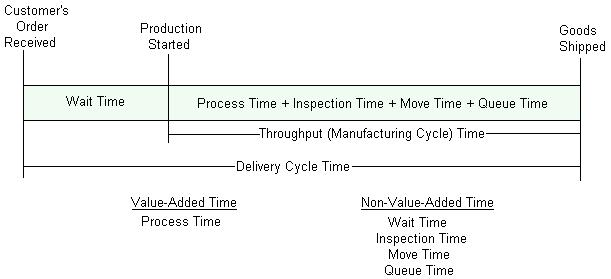Manufacturing Cycle Efficiency
(MCE)
A Measure of Internal
Business Process Performance:
Manufacturing cycle efficiency (MCE)
is an important measure of internal
business process performance.
Performance measures are found on the
balanced scorecards of the companies. Examples of the some
performance measures can be found on
characteristics of balanced scorecard page. Most
of the performance measures are self explanatory.
However, three are not -
delivery cycle time,
throughput time, and manufacturing cycle efficiency
(MCE). On this page, manufacturing cycle efficiency
(MCE) is defined,
explained and calculated.
Definition and Explanation:
value
added time as a percentage of
throughput time
is called manufacturing cycle efficiency.
Through concerted efforts to eliminate the non-value
added activities such as inspecting, moving, and
queuing, some companies have reduced their
throughput time
to only a fraction of previous levels. In turn, this
has helped to reduce the delivery cycle time from
months to only weeks or hours. Throughput time,
which is considered to be a key measure in delivery
performance, can be put into better perspective by
computing the manufacturing cycle efficiency (MCE).
Exhibit 1-1:
Delivery Cycle Time and Throughput (Manufacturing
Cycle) Time

Formula:
|
MCE = Value-added time / Throughput time |
If the MCE is less
than 1, then non-value added time is present in the
production process. An MCE of 0.5, for example,
would mean that half of the total production time
consisted of inspection, moving, and similar
non-value-added activities. In many manufacturing
companies, it is less than 0.1 (10%), which means
that 90% of the time a unit is in process is spent
on activities that do not add value to the product.
By monitoring the MCE, companies are able to reduce
non-value-added activities and thus get products
into the hands of customers more quickly and at a
lower cost.
Example
Calculation of
Manufacturing Cycle Efficiency:
Novex Company keeps
careful track of the time relating to orders and
their production. During the most recent quarter,
the following average times were recorded for each
unit or order:
| Wait
time |
17.0 |
|
Inspection time |
0.4 |
|
Process time |
2.0 |
| Move
time |
0.6 |
| Queue
time |
5.0 |
Goods are shipped as soon as production is
completed.
Required:
Calculate manufacturing cycle
efficiency.
Solution:
MCE =
Value-added time
/ Throughput time
MCE = 2.0
days*
/ 8.0 days**
= 0.25
*Only
process time (2.0 days) represents
value-added time
**Throughput
time = Process time + Inspection time + move time +
Queue time
= 2.0
days + 0.4 days + 0.6 days + 5.0 days
= 8.0
days
Real Business
Example:
Expediting Loan Applications:
Banks ordinarily require three to four weeks
to approve an application for a mortgage
loan on a house. The application form
includes the individual's employment
history, income, and financial assets and
liabilities. Personnel at the ban check
credit references and review the entire
application before granting the loan. A
manager at one bank wondered why this this
process takes so long and asked employees to
keep track of how much time they actually
worked on processing an application. He
discovered that processing an application
took on average 26 days, but only about 15
minutes of this time was actual work. All of
the rest of the time the application was
waiting to someone's in-basket. The
manufacturing cycle efficiency was therefore
only 0.0004 [15 minutes / (26 days × 24
hours per day × 60 minutes per hour)]. By
redesigning and automating the process, the
cycle time was cut down to 15 minutes and
the MCE rose up to 1.0. Loan applicants can
now have a cup of coffee while waiting for
approval.
Source: Kaplan and Norton, Translating
Strategy into Action: The Balance Scorecard,
1996, pp. 118-119 |
Relevant Articles:
|